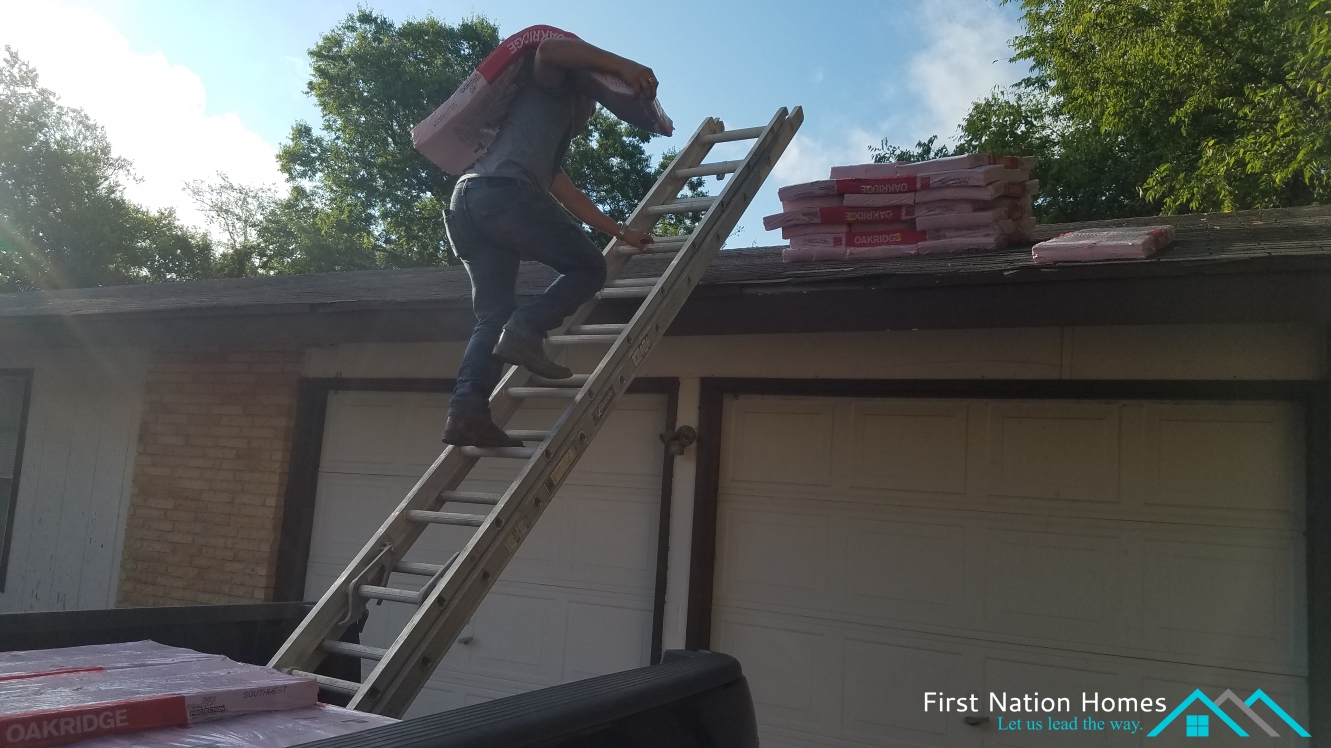No Credit Home Buying with First Nation Homes
This will be a tale of how my first real estate deal was a showcase for “Amateur Hour” with a hidden success story buried within. In late 2018 my first real estate deal would be a game changer for me and my family, with a relatively large amount of money to be made. My partner and I crunched numbers and continued to reach out for advice from anyone who would listen, but this deal would unfold much differently than anticipated. What was the worst that could happen, right?
In September my best friend Kevin calls with some exciting news that he landed a real estate contract. The contract was a purchase agreement to buy a house for $75,000. I remember saying, “That’s great I’m happy for you, talk to you later!” he immediately cut me off before I could hang up and said, “Wait! I need money for the deal.” I didn’t know what to say, especially since I didn’t have $75,000, or know the first thing about real estate. After an hour of Kevin explaining how he landed the contract and how this deal could be good money, my enthusiasm was set high. Now that I could see Kevin’s vision and am excited to make a profit, I begin reading and watching endless YouTube videos in hopes that I can become a real estate investor overnight.
The house was a 4 bedroom, 2 bath single family home totaling up to 1,161 square feet and with that we estimated that the house could sell for about $140,000, after one heck of a remodel. This sounded like ten types of awesome. The first step was to close the deal with the original homeowner. I started searching the web and decided to go with a very well know mortgage company, whose name rhythms with pocket mortgage. The process was smooth, but since the house needed so much work, a conventional loan was my cheapest option that required 10% down. This was not ideal but would due especially since we were running out of time because our purchase agreement stated we would close the deal in 30 days. Now that I am approved for the loan our next challenge is to find the $25,000 we need to remodel the house. Kevin suggest a double close to capture the equity in the home. The idea is for the original homeowner to sell the house to Kevin for $75,000 and then Kevin sells the house to me for $90,000 in one transaction. This equates to a $15,000 profit we can use to rehab the house. I immediately call the mortgage company and tell them I need $90,000 instead of $75,000, causing a slight delay. The mortgage company calls me and tells me I am good to go, but that I must replace the roof and fix the broken windows before we can close on the house. Well great, what do we do now? Without the mortgage we cannot close the deal with the original homeowner, so Kevin and I decide to take a leap of faith and fix the house immediately, so that the mortgage company will allow us to close. Two days later we hire contractors to come out and replace the roof and fix the windows and in order to cut cost, Kevin and I worked alongside the hired contractors.
The house is now up to the mortgage company’s standards and its finally time to close. We take all the needed documents to the title company and are ready to sign on the dotted line. The title agent looks to Kevin and asked, “How will you be paying the $75,000? by wire or cash?” We explain that we will be using my (Augustine’s) mortgage to close. She apologizes and lets us know that in order to do a double close, Kevin must close with the original homeowner first with his own money. For the love of Pete, we were completely caught off guard and headed back to the drawing board. Kevin did more research and found a local transactional funding lender in town. He borrowed the money to close the first transaction, but there was a hefty fee of about $3,000. It’s now time to close on the second transaction between Kevin and I, so back to title company we go. My mortgage was already approved, and I “just” needed $17,000 for closing cost and down payment. This was a lot of money to me, as I had been saving up for years. Finally, the house is in my name, and now to collect the $15,000 to start remodeling, right? Wrong.
Kevin calls to tells me there is a problem with the $15,000 margin we budgeted. Unknowingly, in the purchase agreement Kevin agreed to pay back property taxes on the house. The back property taxes added up to about $7,500, but that was not the only issue, he also had another $3,000 in back payments for child support. This was a devesting blow to the entire project because after title fees, closing cost, transactional funding fees, back taxes and back payments for child support we were left with a measly $200 bucks. At this point I couldn’t think of another thing that could possibly go wrong, but ask and you shall receive my friend. The money for rehab was gone and I get to move into this subpar uncompleted house, but let’s not forget it has a brand-new roof (eye rolling sarcastically), yippee!
It is time to find a buyer as I live there and continue to fix the house with the little money I have left. Good news is on the horizon, Kevin finds a buyer and as soon as they get approved for an FHA loan I can move out and they can move in. This is music to my ears, and I jump for joy (imagine a grown man jumping for joy). However, my overwhelming joy is short lived. A month goes by and still there is no approval from the bank for the new home buyers. Even if they did get approved, I was unaware of the FHA’s 90-day rule (amateur, right). The FHA 90-day rule states that you cannot acquire a home with FHA funding until the house has matured for 90 days after the last sales transaction. Kevin calls me and suggest I should use an owner finance agreement. An owner finance agreement states that the mortgage will stay in the seller’s name, but the deed will be sold to the new homeowner in conjunction to the owner finance addendum. After doing my own research this sounds like the best option to get the new buyers in the house, because the new buyers were unable to get approved for a loan. I call the buyers and let them know about owner finance and they agree to the terms, but would like to move in right away. I have always considered myself to be a very friendly and trusting person, so I let them move into the house as I am moving out. The new buyers are pretty much all moved in and I am more than ready to get the house sold. I contact a real estate lawyer to close the house purchase. One major problem, the new homeowner calls me and tells me he must have emergency surgery to remove his ruptured appendix spending all of the down payment.
What do I do now as they are now living in the house? I reach out to another friend, James, and asked him what I could do, because I had already let them move in. It seemed like James reached through the phone and grabbed my collar saying, “You let them move in without signing a contract or putting any money in escrow?!” to which I could only reply, “Uhhh yeah.” This was a huge mistake on my part and nothing short of an amateur move, but what is done is done. For the next three months I charged the soon to be new homeowners rent. Allowing them to save up money for the down payment. At this point it is now March 2019, four months after I closed on the house and moved in and out. On April 1st we walked into my lawyer’s office and closed the deal on an owner finance contract with a sales price of $125,000, 9% percent interest rate, and a ten year balloon.
Deep breath, the deal is done, and I learned the hard way what to do and what not to do. Speaking from experience never ever, ever, ever relay on verbal agreements, because they mean nothing. All agreements and conditions must be in writing and notarized. Secondly, take your time do not rush into a deal just because you think there is profit to be made do your research and consultant experienced investors and even your real estate attorney. When starting off as a newbie in real estate do not go with the huge banks, but alternatively visit your small local banks. Your local banks typically are more forgiving and have lower processing and origination fees. Finally, trust but verify every aspect of a deal no one’s word is above it. Throughout this deal I weighted heavily on my own judgment without cross referencing with an experienced real estate investor or attorney, which was a huge mistake.
There is a success story buried underneath all the let downs and set back, which is real world experience. Yes, of course I was still able to make a decent profit, not nearly what I was hoping for, but at this point I was just happy to have the shirt on my back. The experience I gained from my Amateur Hour: My First Real Estate Deal is priceless and now I have the tools to take my investing to the next level. I leave my ego and heart at the door every time I enter a negotiation and work with two new coaches that have a 25 years real estate experience. My new partners are my life line and I am just a pawn at this point of my real estate career, but I am learning from them and from each deal we close. The proof is in the pudding as we are now First Nation Homes which was founded on organic growth of real estate enthusiast and professionals in San Antonio, Texas.
Augustine Ureste III
Real Estate Investor
First Nation Homes











